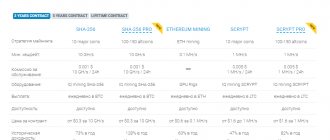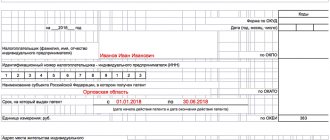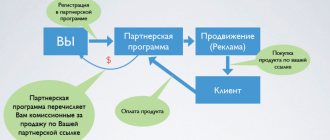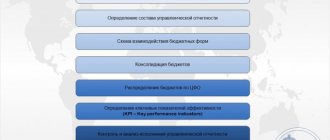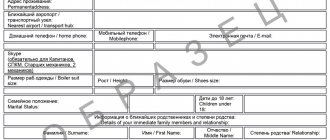○ Basic rules for writing an autobiography.
In order for your autobiography to help you get the job you want or place in an educational institution as much as possible, it is important to take into account the subtleties of drafting the document. Let's see what exactly you need to pay attention to.
✔ Contents of the autobiography.
The law does not establish a strict form for drawing up this document. On the one hand, this gives a certain freedom, allowing you to write in any form, but on the other hand, it complicates writing an autobiography - after all, not everyone knows what facts need to be indicated and how exactly to do it.
Here is the minimum information you must include in the document:
- Full name.
- Date of birth and/or age.
- Place of birth and/or residence (if not the same).
- Education received: you must indicate both basic and special education, including advanced training courses.
- Labor activity: where, during what period and by whom they worked, reasons for changing jobs.
- Marital status and brief information about the closest family members (husband/wife, parents, children).
- Hobbies, achievements, awards, etc.
You can add any points at your discretion, but you must keep in mind that the information should be presented in a concise form. An essay written on several pages is unlikely to evoke positive emotions among employers.
✔ Filling order.
When writing an autobiography, you need to adhere to chronological order. Also, do not forget that this is an official document, so information should be presented in concise sentences.
Follow this order:
- At the top of the document, the title is written in the middle, after which there is no period, and the next sentence begins with a new paragraph.
- An autobiography is written in the first person, singular. It begins with the pronoun “I”, after which a comma is placed and the full name is written.
- The date and place of birth are indicated, you can write the occupation of the parents (born into a family of doctors, teachers, etc.).
- Below is information about the education received, starting from school. The name of the educational institution is written, on the contrary - the years of study and the assigned qualification. Don't forget to list all courses, trainings and seminars you attended in title/date format.
- Work experience (if any): starts from the first place of work, indicating the period of stay in this place and a brief description of your duties. The remaining places of work are also indicated, each starting on a new line.
- Scientific works, publications and other achievements indicating the title and year of implementation.
- Additional responsibilities (if any). For example, indicate that you successfully performed the duties of your manager while he was on vacation (sick leave), write what you were able to achieve during this period.
- A hobby, especially if it is related to professional activity and there are achievements in it.
- Information about personal life: marital status, presence/number of children, occupation of husband/wife.
The information must be clearly divided into information blocks, each of which begins with a red line. At the end, an indentation is made downwards, on the left is the date (the date of the year in numbers, the month in words), on the right is the signature of the author of the document.
How to write a short biography
A brief autobiography should be presented in the first person, and the writing style should be narrative. Only a few people pay attention to the literacy and quality of presentation of information. Numerous grammatical and punctuation errors are very noticeable. In this case, the logic and quality of presentation of the text is also poor. This should always be remembered and paid attention to. In a short autobiography, it is enough to indicate the following information: full name and exact date of birth; education data; information about work experience, if any; describe in detail the composition of the family. After which, the date of writing and the author’s signature from it are put.
Compiling a short CV is often necessary when applying for a preliminary interview for employment. It is very important that this document contains the necessary minimum information and does not contain excess. Plus, don’t forget about the literacy in compiling and presenting the information itself. A sample short
biography will add practical understanding , which will allow you to see the necessary accents when writing. After the text is written, you will need to re-read it several times and make sure that the logical chain is not lost, and then check the punctuation and spelling.
○ Autobiography for work.
The general principle of drawing up a document when applying for a job is standard. But here the following points should be emphasized:
- Write down the personal qualities that are required for the job you are applying for - this will not only save time when processing the document, but will also allow you to be assessed as objectively as possible as a candidate.
- Pay attention to the projects you have worked on - this will show your ability to work in a team.
- Describe your education, but focus on your professional success.
- Reflect your wishes for work: the form of work (for example, if you like to work independently, write about it), the desired salary, the possibility of business trips, etc.
✔ Autobiography examples.
Since there is no established form for drawing up a document, you can use the attached example as a sample. All other autobiographies can be written in a similar way, the only difference will be what to emphasize: everyone’s achievements and professional experience are different.
(2877 downloads)
✔ How to write an autobiography for a student?
The general rules for drawing up a document are the same as when applying for a job. But since there are no professional achievements in this case, emphasis should be placed on the knowledge accumulated during training (successful completion of internship, participation in seminars at different levels, completion of additional courses, knowledge of foreign languages, etc.).
✔ How to write for a person who is looking for a job for the first time?
If you do not have professional experience, you need to put maximum emphasis on your personal qualities that are suitable for the job you want to get. It should be borne in mind that if you can present everything in a favorable light, this will characterize you in a special way and lack of experience will not be an obstacle to hiring.
How best to write: TOP 7 useful tips
Despite the fact that formally there are no requirements for the text, in practice a certain standard of presentation has developed. Of course, no spelling, punctuation, grammatical or other errors are acceptable. Along with this, it is useful to listen to the following tips:
- First of all, you need to keep in mind that all information in the document must be very accurate, detailed and truthful. All false data will be very easily detected, and even the very fact of deliberate deception can cause the relevant persons to refuse to hire a candidate. In addition, he is unlikely to be able to try to get similar positions again.
- The style of presentation should be close to formal business. Epithets, catchphrases, metaphors and other figures of speech are unacceptable. In general, the text should be fairly “dry” and concise. However, all data must be presented in great detail - i.e. not one, but all places of work, not one educational institution, but all, etc.
- Sentences are built very simple, like “Subject, predicate, other members of the sentence.” For example: “From 2008 to 2013 I studied at Moscow State University, Faculty of Law,” and not “I studied for 5 years, from 2008 to 2013, at Moscow State University, Faculty of Law.”
- The names of each authority, locality and other data are provided only in the official, complete wording.
- It should only be 1 page (as indicated in the sample) - it is better not to violate this volume so as not to spoil the perception.
- It is unacceptable to praise yourself or emphasize any of your qualities, for example: “I do a very good job that requires thoughtfulness, perseverance and attentiveness. I am always punctual, responsible and approach my work with a high sense of duty.” At the same time, it is quite reasonable to indicate your achievements, confirmed by documents (for example, sports category, honors diploma, etc.).
- And to really highlight your competitive advantages, it is better to use more neutral words that are acceptable to use in accordance with the rules of business style, for example: “I have been interested in martial arts for the last 5 years. I see this sport as a good opportunity to constantly maintain physical fitness.
Thus, the sample itself only allows you to draw the outlines of the essay, but does not provide any answers as to how best to write it. This can only be understood on the basis of practical examples, which are discussed below.
○ Nuances and features.
Although the candidate is given relative freedom in the preparation of this document, some subtleties should be taken into account:
- Conciseness is the official business language without the use of artistic expressions.
- Volume – it is advisable to fit the entire text on one page, because, as a rule, there are many candidates, but there is no time to carefully process the information. Therefore, give a potential employer the opportunity to evaluate your qualities without putting in extra effort.
- Form of compilation - you can print your autobiography in advance and attach it to other documents. But be prepared that you will most likely be asked to write it by hand. Therefore, composure and the ability to instantly concentrate on what is important are necessary.
Thus, drawing up an autobiography does not present much difficulty if you approach the preparation of the document correctly. If you compose it correctly, the likelihood of a successful interview outcome increases significantly.
Rules and sample autobiography
All information must be presented in chronological order:
The description of each event must begin with two dates, which indicate the beginning and end of a certain period in life. There must be a hyphen between them. For example: “1987-1993 – worked in the Chic store as an administrator.”- To indicate a specific period, you need to use prepositions. For example, “From 1998 to 2002 I studied at secondary school No. 1 in Moscow.” The student’s autobiography must certainly contain such a point.
- If the date is indicated after the description of the event, then it must be written in brackets. For example: “I entered Moscow State University (1988). After completing her master’s degree (1994), she completed an internship at Sberbank of Russia.”
How to write an autobiography for the FSB
There are no uniform forms and rules for writing an autobiography for working in the FSB. However, when drawing up a document, you should still adhere to certain recommendations:
- format the text correctly, with elements of a business style, legible handwriting, without punctuation, spelling and other errors;
- Corrections and blots are not allowed, and the use of green, red and other colored paste, except blue or black, for writing is also prohibited;
- The volume of the autobiography is no more than two A4 sheets;
- the information provided must be complete and must contain your full name, date and place of birth, information about family members;
- Laconically and at the same time describe in detail extremely significant events from your life;
- structure information about yourself, presenting it in chronological order, starting from your birthday and ending with the present time;
- provide only truthful information, without distorting or exaggerating the facts, since lies can sooner or later become clear and ruin your reputation forever;
- It is allowed to present an autobiography in any form, but it is necessary to take into account the sequence of the narrative.
What to include in your FSB autobiography
The generally accepted beginning of a document is the word “AUTOBIOGRAPHY” without a period at the end. In the main part of the autobiography for the FSB, it is recommended to set out the following main points:
- last name, first name and patronymic (in full);
- date and place of birth;
- information about education (with a note about the name of each educational institution, date of admission and graduation). If you have a certificate or diploma with honors, please indicate this;
- work activity (names of enterprises, positions held and periods of work, you can also add reasons for dismissal);
- information about marital status and immediate relatives (spouse, children, parents, siblings) indicating the full name, date of birth, position and place of work of each;
- data on military service (unit, unit number, years of service, final rank);
- the presence or absence of a criminal record. If available, it is mandatory to indicate the article and the penalty;
- data on visits to foreign countries (country, year, duration of visit, purpose);
- information about bringing close relatives to criminal or administrative liability (full name, degree of relationship, date of birth, article, punishment);
- information about close relatives living abroad, if any (full name, degree of relationship, date of birth, country, duration and reason for staying abroad).
Additionally, you can also provide the following information:
- the presence/absence of injuries, operations, mental and chronic diseases, since when hiring at the FSB, increased attention is paid to the health of employees;
- preferred sports and your achievements in them;
- level of computer skills;
- having a driving license;
- women can note data on maternity leave and child care;
- personal qualities of character;
- information about interesting and useful hobbies;
- information about minor bad habits.
The last line of your autobiography should include:
- on the left - the date the document was compiled;
- on the right - the author's surname and initials;
- in the center - personal signature.
Below is an approximate sample of an autobiography in the FSB. If you wish, you can change or supplement it at your discretion. The free form of writing a document allows you to do this. The main thing to remember is that the purpose of an autobiography is to highlight all your strengths. A properly drafted paper can help you find your desired job and change your life for the better.
A detailed example of writing an autobiography based on the sample
Since November 2012, he served in military service. From 2012 to 2013 in military unit 34567 as a driver-mechanic of a multi-purpose tracked tractor, and from 2013 until entering contract service in military unit 86112 as commander of the repair and restoration crew of a mobile repair shop.
- basic vocational education, periods of study, name of educational institution;
- professional courses and advanced training courses;
- achievements and participation in professional competitions;
- periods of work in the main and additional specialty;
- experience.
Main points
The autobiography should set out the main blocks of information, which include information such as:
- Full name, date and place of birth. This information can be indicated in several ways. For example, like an essay: “I, Nikitin Valery Sergeevich, was born on January 10, 1970 in the city of St. Petersburg.” Or as in the questionnaire: “Nikitin Valery Sergeevich. Date of birth: January 10, 1970. Place of birth: the city of St. Petersburg."
- Information about parents: name, year of birth and profession. For example: “Father – Nikitin Sergey Fedorovich, born in 1940, design engineer. Mother - Nikitina Anna Andreevna, born in 1945, therapist.”
- Next, you should describe the education you received. In this case, it is worth indicating the institutions in which the training took place, the periods and the results obtained. For example, it might look like this: “He graduated from secondary school No. 1 in the city of St. Petersburg in 1982.” If during the period of study significant heights were achieved, for example, a person graduated from school with a gold medal or won some international competition, then this can also be indicated. A sample autobiography with similar notes will be discussed below.
- Next, you need to indicate the following levels of education: secondary or higher. If it is not completed, then it is imperative to indicate the reason in your autobiography, but only if it does not relate to your failure. Some students work in parallel during their studies. In this case, you should definitely indicate this in your autobiography. It is also worth mentioning if the university was graduated with honors and with any other awards.
- The autobiography of a military man or a man who served in the army must certainly contain information about the place of service, the period of service and the rank received.
- This is the point that completes the main part. It must contain information about all places of work: company name, position, period. For example, like this: “In January 1983, I started working at the Finance and Credit bank as a cashier.” If a person worked at several enterprises, then everything must be indicated. If at the time of compiling his autobiography he did not work anywhere, then it is recommended to indicate information about whether he was officially recognized as unemployed and whether he was on the labor exchange.
How to write an autobiography for the FSB
There is no standard template for an autobiography in the FSB, but the following information must be indicated in it without fail:
- title of the document – AUTOBIOGRAPHY;
- Full name, date and place of birth. For example: “I, Ilyin Evgeniy Sergeevich, was born on May 20, 1975 in the city of Serpukhov, Moscow region”;
- information about education (full name of educational institutions, period of study, specialty);
- information about work activities (places of work, positions held);
- Military service;
- marital status, information about immediate relatives (full name, year of birth, place of work/study and residential address);
- information about trips abroad (where, when and for what purpose);
- information about bringing close relatives to criminal liability (when and for what);
- date of writing the autobiography and signature.
Let's give an example of an autobiography in the FSB, which will serve as a template for writing your own biography.
In 1990 I went to the first grade of secondary school No. 145 in Moscow, from which I graduated in 2000 with a medal.
Since 2000, he studied at the Military-Political Academy named after. V.I. Lenin at the Faculty of Military Law, which he graduated in 2005 and received a full higher education in the specialty “Legal Support of National Security”. Candidate of Legal Sciences.
From 2006 to 2007 – service in the army (missile forces, senior sergeant in the reserve).
Since September 2008, I have been working as the head of the security service at Megamarket LLC.
Family composition: wife - Voronina Anna Vladimirovna, born in 1985, economist at Freedom LLC; son – Voronin Kirill Alekseevich, born in 2009.
We live at the address: Moscow, st. Liteinaya, 45, apt. 123.
In 2008-2013, he visited France, Italy, and Germany for tourism purposes.
Neither I nor my immediate relatives were under investigation and have no criminal record. There are no relatives outside the CIS.
Below is an approximate sample of an autobiography in the FSB. If you wish, you can change or supplement it at your discretion. The free form of writing a document allows you to do this. The main thing to remember is that the purpose of an autobiography is to highlight all your strengths. A properly drafted paper can help you find your desired job and change your life for the better.
- the presence/absence of injuries, operations, mental and chronic diseases, since when hiring at the FSB, increased attention is paid to the health of employees;
- preferred sports and your achievements in them;
- level of computer skills;
- having a driving license;
- women can note data on maternity leave and child care;
- personal qualities of character;
- information about interesting and useful hobbies;
- information about minor bad habits.



